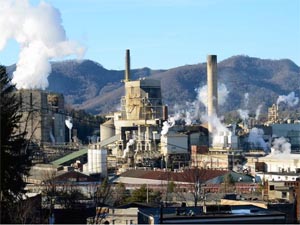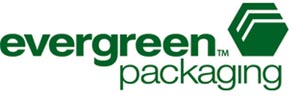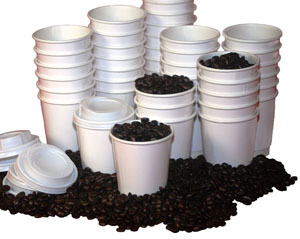Evergreen Packaging’s Hot Success with Hot Coffee Cup Production
![]() Print this Article | Send to Colleague
Print this Article | Send to Colleague
 There’s great news in the marketplace for Evergreen Packaging’s paper and paperboard mill in Canton, N.C, USA. Americans’ growing love affair with fancy coffee has led to significant new demand for the stiff, coated paperboard that the mill is known for. Styrofoam is on the outs due its bad rap, ecologically, creating even more demand for paper hot cups.
There’s great news in the marketplace for Evergreen Packaging’s paper and paperboard mill in Canton, N.C, USA. Americans’ growing love affair with fancy coffee has led to significant new demand for the stiff, coated paperboard that the mill is known for. Styrofoam is on the outs due its bad rap, ecologically, creating even more demand for paper hot cups.
Evergreen has become a market leader in the paperboard line used to make hot cups — and paper cups found at some of the nation’s leading coffee retailers across the country are now being made at the facility in Haywood County, N.C.
"Our cups are recyclable and renewable. It gives us an environmental advantage," said Dane Griswold, Evergreen’s mill manager in Canton. Griswold shouted to be heard over the rumble of the turning machine components inside of the mill as he walked the length of the board paper machine used to create the paper-based medium for final production of the company’s successful hot cups.
The Canton paper mill was historically known as a paper carton champion before plastic made its way onto shelves as a mainstay. Its thick coated board paper was found in the orange juice and dairy aisles of grocery stores across the U.S.
"We still make a lot of that," Griswold said. "A few hundred tpd, in fact."
But carton demand has declined slowly now going into a third decade as plastic screw-top bottles edge out the folding table-top cartons. Meanwhile, sky-rocketing demand for paper coffee cups has come on like a shot of adrenaline. Furthermore, it’s all predicted to continue growing in demand. McDonald’s and Dunkin’ Donuts have announced they’re quitting Styrofoam. New York City has even banned Styrofoam.
The Canton mill now makes more paperboard for hot cups than it does cartons and may have to soon increase capacity for board.
 Another sector on the upward swing at Evergreen—food trays found in frozen dinners. More are now being made out of stiff coated paper instead of plastic. About 9% of the Canton mill’s board paper line now goes to making frozen dinner trays.
Another sector on the upward swing at Evergreen—food trays found in frozen dinners. More are now being made out of stiff coated paper instead of plastic. About 9% of the Canton mill’s board paper line now goes to making frozen dinner trays.Evergreen’s website bills its paperboard packaging as a sustainable and environmentally friendly alternative to both plastic and Styrofoam.
Now a proven player in the burgeoning hot cup market, the formerly struggling paper-only mill is likely in the best shape it’s been in over a decade when it comes to new board production and technology.
But board paper accounts for only half of the paper mill’s operation. The other half is still regular paper — the kind used for printer paper, office paper, photocopier paper, envelopes, and junk mail.
"Junk mail? What are you calling junk mail?" Griswold joked. Touché, bring on the junk mail, in the eyes of the mill and its workers. Unfortunately for the mill, paper use has plummeted in the American workplace, schools, and halls of government.
Rumors circulating this past year that the mill was for sale sent shock waves through Canton. The rumor was real, according to industry experts, but it’s not for sale anymore.
"Evergreen was technically being put up for sale by Rank. But then they said they were going to keep Evergreen," McLaren said. A major factor in keeping the mill open and maintained is suspected to be the major and rather sudden success of hot coffee paper cup production at the North Carolina facility.

The paper mill has been a mainstay of the economic and social landscape in Haywood County for a century. The mill nearly closed in the 1990s, but the workers rallied to keep it open, partnering (temporarily) with a venture capitalist to form an employee-owned mill once known as Blue Ridge Paper.
Today, Evergreen’s website bills its paperboard packaging made at the Canton mill as a sustainable and environmentally friendly alternative to both plastic and Styrofoam.


